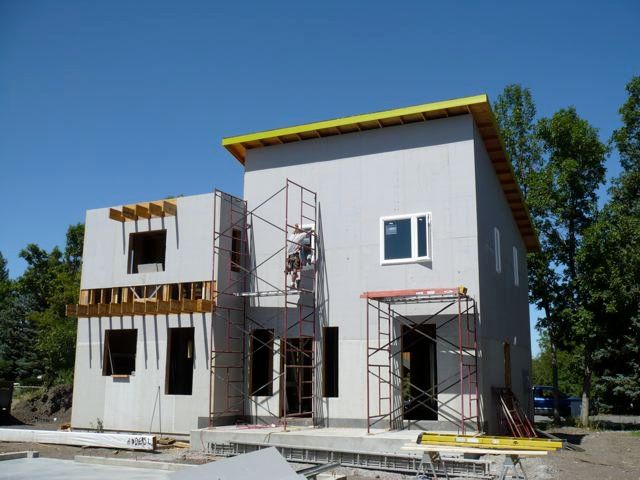
Can we build our way out of this recession?
Anders Lewendal, a builder in Bozeman, thinks so. He’s about halfway through building what he’s pitching as “The All-American Home,” a 2,000 sq. ft., two-story house constructed entirely of U.S.-made materials.
Now it’s probably true that the bulk of building materials that go into the average American home are sourced pretty close to home already. In fact, you can probably build a 70-percent American home without even trying. But Lewendal is out to make a point: By paying attention to where products are made, and incrementally pumping up American suppliers, builders (who are still building) can rev up the economy.
5% could make a big difference
By his calculation, if builders reallocated just 5% of their construction spending to American-made products, they’d add $14 billion to the U.S. economy. So on a Facebook page for his cause, he’s asking fellow builders to register for what he calls the “5% Club.”
It’s not a nationalistic idea, nor a partisan one, Lewendal emphasizes. He’s a small builder who constructs a half-dozen homes in a good year, and acknowledges heading up a national cause is good publicity. But he’s also using this as a learning experience, for himself and for other builders encouraged to do the same thing, and he’s started work on a database (see below) of American-made products used on this project.
“We don’t need every builder to build every single home with all-American products,” he told me. “That’s not practical and it’s not necessary.” But before handing over less money for a foreign product, he suggests considering the true cost. He makes a point with collated nails. American-made Maze or TrueSpec cost him more per box, but they don’t jam his gun the way the cheaper Chinese-made ones do. So it’s like this: spend money=save time=save money=save economy.
“It may be a little naïve or optimistic,” he says. “but it could happen.”
Products used in the “All-American Home”
| Product | Manufacturer/Supplier | Mfg. State | |
| J bolts/foundation | S.C. Prototypes | Montana | |
| J bolts/foundation/stock | Pacific Steel | Utah | |
| Gorilla Duct tape | The Gorilla Glue Co | Ohio | |
| 4″ perforated pipe, radon | Northern Pipe Co. | N. Dakota | |
| 4″ pvc fittings | GPK | N. Dakota | |
| pvc glue | Oatey | Ohio | |
| 8d ring shank nails | True Spec | CA | |
| 16d sinkers | Griptite | WS | |
| 1/2″ foundation nuts | CAT | Il | |
| gun nails | Maze | Il | |
| damp proofing | Mulseal/Tremco | OH | |
| Rebar | Nucor | Utah | |
| Concrete. Includes below | CMI | MT | |
| Concrete Portland | Ashgrove | MT | |
| Concrete aggregate | CMC. Beglade | MT | |
| Concrete sand | CMC. Beglade | MT | |
| Hangers, straps, H clips | Simpson Strong-Tie | CA | |
| TJI’s | I-Level Truss Joist | Oregon | |
| 2×4’s and 2×6’s | RY Lumber | MT | |
| Plywood | Potlatch | Idaho | |
| 2×4’s and 2×6’s | F.H. Stoltze | MT | |
| 2×4’s and 2×6’s | Idaho Forest | Idaho | |
| PL 400 sub floor adhesive | Loctite | CT | |
| Miratec fascia | CMI Corp | PA | |
| treated plate | Mc Farland | WA | |
| T braces/framing | Appleton Supply | WI | |
| sill seal | Reflectix | IN | |
| powder actuated pins | TW Ramset/Redhead | IL | |
| ridgid foam | Dow | IL | |
| Spray paint | Rustoleum | IL | |
Fine Homebuilding Recommended Products
Fine Homebuilding receives a commission for items purchased through links on this site, including Amazon Associates and other affiliate advertising programs.

Handy Heat Gun

Reliable Crimp Connectors

8067 All-Weather Flashing Tape
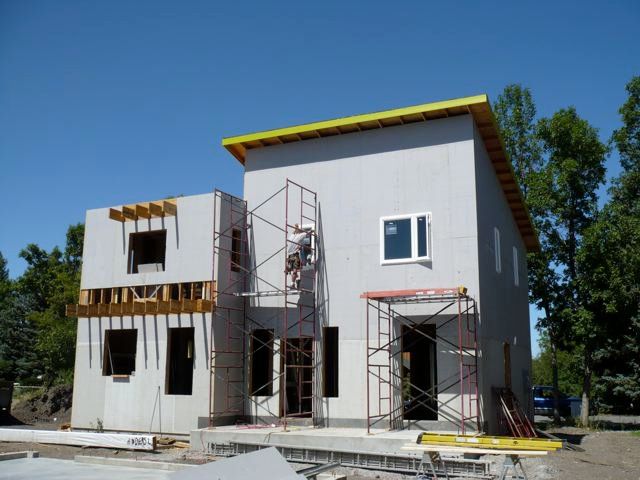
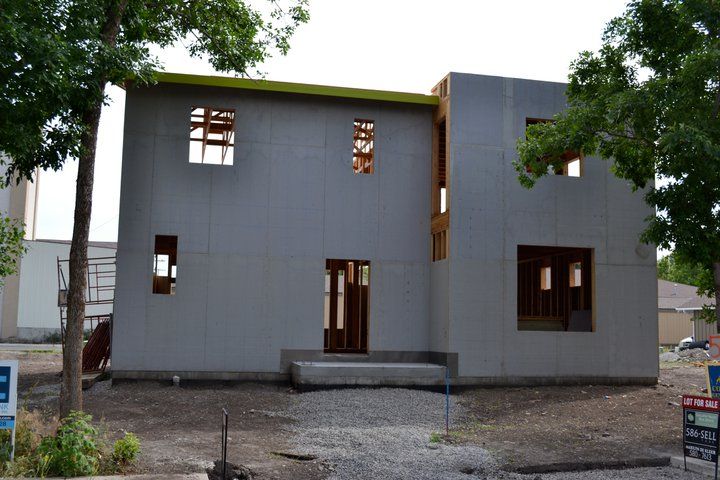
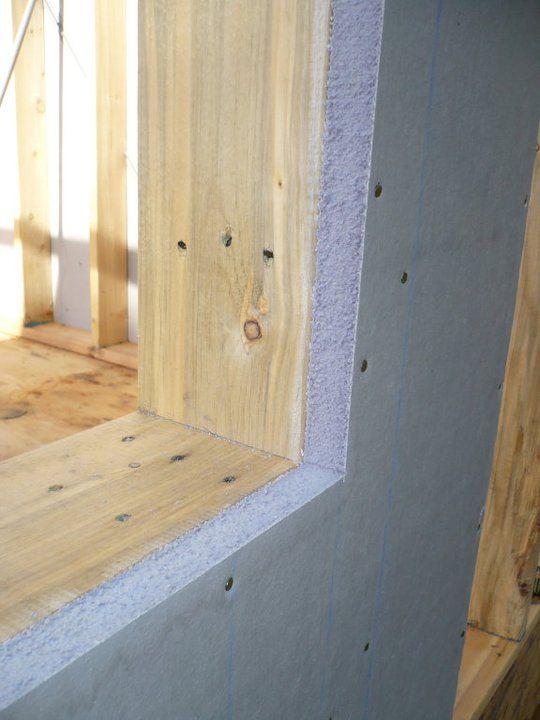
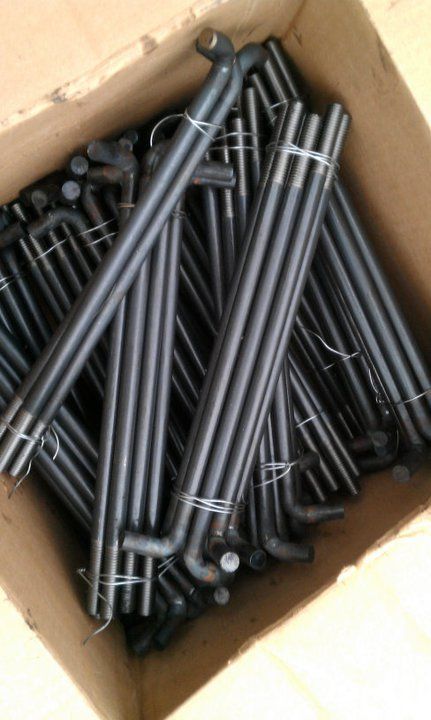




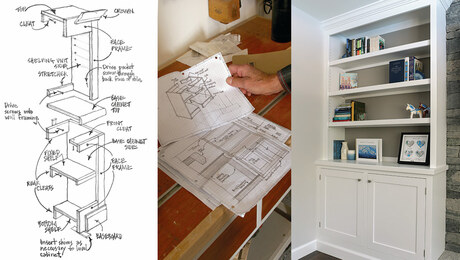


















View Comments
Hmm, about halfway done you say?
I can almost guarantee that finding products for the first half is waaaaay easier than finding USA made products for the last half.
The more complex the product, the more likely it will have a "Made in China" sticker on it..... electrical outlets, light fixtures, plumbing fixtures, dishwasher hose, towel bar, door knob, coffee maker, thermostat. It's either that or the opposite extreme as in the little things (cheap products we take for granted) that will trip you up when trying to buy American.
Sure, there are probably american companies that make all these things but at a premium price. At some point your books need to balance and you gotta make hard decisions.
While we are on the subject, I gotta give a nod to Menards... it's a privately owned building supply warehouse here in the midwest that specifically points out USA made products in it's fliers. Their prices are often LOWER than the other box stores and their in-store selection is at least 2-3 times larger. In fact, they carry so many items that it can sometimes get weird (they actually have a grocery section) and to be competitive they have a lot of off brand products - albeit American made off brand products.
check 'em out at http://www.menards.com if you've never heard of them.
DC
Thanks for posting this story. Buying "local" can lead to more sustainable building just like shopping at farmers' markets leads to more sustainable agriculture. As builders, we need to go even further and make use of salvaged materials whenever possible. Bamboo flooring made in China, shipped to the West Coast, and then trucked to the Northeast can't come close to the green value of wide pine boards from a sawmill just 30 minute's drive from my house.
Dream catcher is absolutely correct. At AmeriSus Homes we launched an all American program last year which has gotten us up to about 96% American products and materials on all of our homes. That has become a level we are having difficulty surpassing. Some products are simply no longer made in America yet we keep trying to find a manufacturer that might be interested. Getting past the numbers, every house we build (for the most part short of that 4%) keeps Americans employed.
The other cost of imported materials is paid by all of us on 15 April. Unemployment payments and welfare and food stamps are the other hidden cost of imported junk, and the lives of honest working people in the "rust belt" are destroyed by there no longer being any honest work for them to do. I'll bet if those costs are factored in, imported materials are more expensive.
Buying toilets recently, discovered that American Standard is starting manufacture of a toilet in the US. Their web site is sensitive to this issue; wouldn't hurt to give them a little love on the issue. And keep the pressure up on US companies to build stuff here, and advertise the fact. If companies were "black listed" because they cut corners with cheap imported components, they might start to evaluate the bottom line issues differently.
Kudos to AmeriSus for building homes with almost all American products. DC is correct that finding all American products takes some effort. Although we are about 60% complete, we have spec'd out American products through completion. With a little research, we are finding American companies we never heard of. The concept here is not necessarily to build with 100% American products every time, but to prove that it can be done. We will succeed. Finding a simple nut made in America proved difficult. Finally, we had to purchase nuts for our J bolts from CAT. Yup, they did cost more, however, we project the total cost of the project is only about 1% to 2% different than using standard building products. We want to promote finding value in American products, not spending dollars just to buy American. Take gun nails for example: A Chinese box of 21 degree collated framing nails costs about $5 more than the American equivalent: TruSpec or Maze. We find the Chinese version jambs at least a few times more often per box than the American nails. We think our carpenters spend more than $5 worth of time cleaning their nail guns. I would say the American nails cost less.
Let's celebrate companies like AmeriSus who have reallocated far more than 5% of their spending from foreign to American products. If all American families reallocated just 5% of their household spending from foreign to American products, we would add something like three million jobs in America. It would not happen overnight, but we would create momentum and confidence.
Join us by encouraging all Americans to promote rebuilding America 5% at a time. Visit our facebook page: http://www.theallamericanhome.com and show your support. Whether you care about social, environmental, or economic issues, can easily support buying local in a global sense.